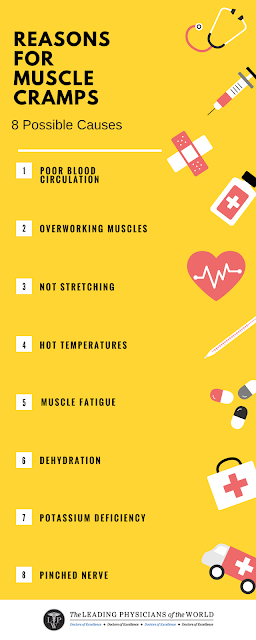Muscle Cramping Reasons - Symptoms and Causes
A musclecramp is a sudden contraction of one or more muscles. If you've ever been
awakened in the night, you know that muscle cramps can cause severe pain.
Though generally harmless, muscle cramps can make it temporarily impossible to
use the affected muscle. Long periods of exercise or physical labor, especially
in hot weather, can lead to muscle cramps. Some medications and certain medical
conditions also may cause muscle cramps. You usually can treat muscle cramps at
home with some helpful self-care measures.
Symptoms
Usually, a
cramp can be very painful, often severely so. Commonly, the sufferer must stop
whatever activity is under way and seek immediatehelp from the cramp.Also, the
person is unable to use the affected muscle while it is cramping. Severe cramps
may be associated with soreness and swelling, which can persist up to several
days after the cramp has subsided. At the time of cramping, the knotted muscle
will bulge, feel very firm, and may be tender.
What Causes Muscle Cramps?
Musclecramps have several causes and some cramps result from overuse of your muscles.
This usually occurs while you’re exercising.Muscle cramps are felt to be caused
by excessively excited nerves that stimulate the muscles. This can occur after
injury to nerve or muscle; dehydration; with low blood levels of calcium,
magnesium, or potassium; from certain medications; and so on.
The pain that is associated with muscle cramps caused by poor
circulation to the legs that worsens with walking is referred to as
claudication. Deficiencies of certain vitamins,
including thiamine (B1), pantothenic acid (B5),
and pyridoxine (B6), can also cause muscle cramps.
Muscle
injuries and dehydration can also trigger cramps. Dehydration is the excessive
loss of fluids in the body. Low levels of any of the following minerals that
contribute to healthy muscle function may also cause muscle cramps:
- calcium
- potassium
- sodium
- magnesium
Low blood
supply to your legs and feet can cause cramping in those areas when you
exercise, walk, or participate in physical activities.In some cases, a medical
condition can cause muscle cramps. These conditions include:
- spinal nerve compression, which can cause muscle cramps in your legs when walking or standing
- pregnancy
- kidney failure
- hypothyroidism
- Inadequate blood supply. Narrowing of the arteries that deliver blood to your legs can produce cramp-like pain in your legs and feet while you're exercising.
- Nerve compression. Compression of nerves in your spine can produce cramp-like pain in your legs. The pain usually worsens the longer you walk. Walking in a slightly flexed position such as you would use when pushing a shopping cart ahead of you may improve or delay the onset of your symptoms.
- Mineral depletion. Too little potassium, calcium or magnesium in your diet can contribute to leg cramps.
Treatment
No
medication is recommended for cramps.If a severe cramp leaves a muscle feeling
tender, a painkiller may help.Quinine has been used in the past, but it is no
longer recommended. The FDA issued a warning in 2010 about potentially
dangerous interactions and side effects.There is limited evidence that exercise
and stretching, calcium channel blockers, and vitamin B-12
may help. Multivitamins may be of some use during pregnancy.There is no
evidence that nonsteroidal anti-inflammatory drugs (NSAIDs), calcium,
or potassium are of any benefit.
There are
no special tests for cramps. Nevertheless, the diagnosis of muscle cramps is
relatively easy. Most people know what cramps are and when
they have one. If present during a cramp, the doctor, or any other bystander,
can feel the tense, firm bulge of the cramped muscle.




Comments
Post a Comment